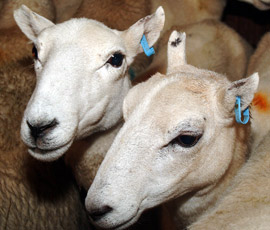DEFRA wins sheep EID postponement

Brussels has announced a three-year delay on individual movement recording for sheep born before 1 Jan 2010 in a move which could save UK farmers £11million.
Laws which would have forced farmers to begin electronic identification of older sheep were due to come into force in just three weeks’ time.
Now, however, the eight million sheep born before 2010 will not have to be electronically identified until the end of 2014.
That could save between £4m and £11.5m over the next three years as many of the older breeding ewes in flocks will be culled out before they need to be tagged.
The crucial delay was won by DEFRA at an EU Commission’s Standing Committee on the Food Chain and Animal Health (SCoFCAH) meeting on 6 December.
Committee officials narrowly voted in favour of the derogation.
DEFRA farm minister Jim Paice said:
“In this economic climate it is not affordable or practical to electronically tag the millions of sheep born before electronic sheep identification was introduced.
“I have been pressing Europe hard to defer the impending individual movement reporting requirement for these older sheep. I am pleased they have listened to us and farmers by delaying this requirement for three years.”
Phil Stocker, chief executive of the National Sheep Association, said he was extremely pleased with the news.
“This is really useful move and in line with the Macdonald report’s aims of reducing red tape.
“This is the right decision and DEFRA have worked hard to achieve it. We should gve them credit for doing so.”
NFU Scotland said it too was delighted with the result as it would ease some of the increasing burden on farmers in managing EID.
“While a compromise, we are delighted with the result,” said livestock policy manager for NFU Scotland, Penny Johnston
“Part of the compromise is that there will be no extension to the derogation beyond 2014. So although this isn’t a permanent solution, the extension from the end of this year to the end of 2014 will significantly reduce the number of older animals likely to be affected.”
NFU livestock board chairman Alastair Mackintosh said it was a victory for common sense which would save producers time and money.
“However, we are very aware that there are still a number of issues for many farmers surrounding EID and the potential to fall foul of cross-compliance. That’s why we will continue to work with Defra and in Brussels to persuade Commission officials to keep this under full review and to adopt a more common-sense approach around tolerances for movement recording.”
A DEFRA spokesman added: “Since 1 January 2010, sheep born in Britain and kept beyond 12 months of age have to be electronically identified to help record when they are moved – for example from holding to market.”
Sheep tagging is important in the management of animal disease. The pre-2010 older sheep can retain their conventional tags, and keepers will be able to continue to record and report their movements as a batch, the DEFRA spokesman said.
This delay will give farmers time to decide how they wish to identify and record their older animals.
Without the agreement to delay, farmers would have to either visually collect and record the sheep’s tag number on movement documents or retrospectively identify them with electronic tags, he said.
